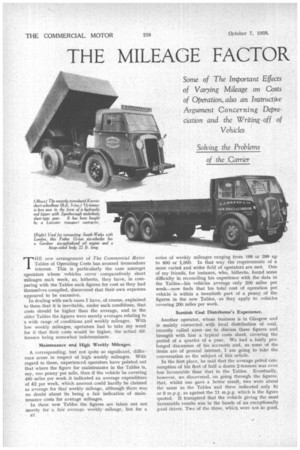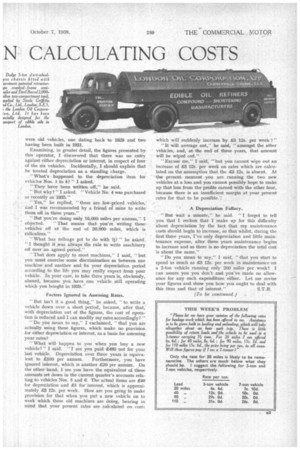THE MILEAGE FACTOR N CALCULATING COSTS
Page 36

Page 37

If you've noticed an error in this article please click here to report it so we can fix it.
Some of The Important Effects of Varying Mileage on Costs of Operation, also an Instructive Argument Concerning Depreciation and the Writingoff of
Vehicles
THE new arrangement of The Commercuil Motor Tables of Operating Costs has aroused tremendous interest. This is particularly the case amongst operators whose vehicles cover comparatively short mileages each week, as, hitherto, they have, in comparing with the Tables such figures for cost as they had themselves compiled, discovered that their own expenses appeared to he excessive.
In dealing with such cases I have, of course, explained. to them that it is inevitable, under such conditions, that costs should be higher than the average, and in the older Tables the figures were merely averages relating to a wide range of .conditions and weekly mileages. With low weekly mileages, operators had to take my word for it that their costs would be higher, the actual difference being somewhat indeterminate.
Maintenance and High Weekly Mileages.
A corresponding, but not quite so significant, difference arose in respect of high weekly mileages. With regard to these, experienced operators have pointed out that where the figure for maintenance in the Tables is, say, one penny per mile, then if the vehicle be covering 480 miles per week it indicated an average expenditure of 42 per week, which amount could hardly be claimed as average for that weekly mileage, although there was no doubt about its being a fair indication of maintenance costs for average mileages.
In these new Tables the figures are taken out not merely for a fair average weekly mileage, but for a a2 series of weekly mileages ranging from 100 or 200 up to 800 or 1,000. In that way the requirements of a more varied and wider field of operators are met. One of my friends, for instance, who, hitherto, found some difficulty in reconciling his experience with the data in the Tables—his vehicles average only 200 miles per week—now finds that his total cost of operation per vehicle is within a twentieth part of a penny of the figures in the new Tables, as they apply to vehicles covering 200 miles per week.
Scottish Coal Distributor's Experience.
Another operator, whose business is in Glasgow and is mainly connected with local distribution of coal, recently called upon me to discuss these figures and brought with him a typical costs sheet, covering the period of a quarter of a year. We had a fairly prolonged discussion of his accounts and, as some of the items are of general interest, I am going to take the conversation as the subject of this article.
In the first place, he said that the average petrol consumption of his fleet of half a dozen 2-tonners was even less favourable than that in the Tables. Eventually, however, we discovered, on going through the figures, that, whilst one gave a better result, two were about the same as the Tables and three indicated only 8/ or 9 m.p.g. as against the 11 m.p.g. which is the figure quoted. It transpired that the vehicle giving the most favourable results was in the hands of an exceptionally good driver. Two of the three, which were not so good, were old vehicles, one dating back to 1829 and two having been built in 1931.
Examining, in greater detail, the figures presented by this operator, I discovered that there was no entry against either depreciation or interest, in respect of four of the six vehicles. Incidentally, I should explain that he treated depreciation as a standing charge.
" What's happened to the depreciation item for vehicles Nos. I to 4?" I asked.
"They have been written off," he said.
"But why?" I asked. "Vehicle No. 4 was purchased as recently as 1985."
"Yes," he replied, "these are low-priced vehicles, and I was recommended by a friend of mine to write. them off in three years."
" But you're doing only 10,000 miles per annum," I objected. "That means that you're writing these vehicles off at the end of 30,000 miles, which is ridiculous."
"What has mileage got to do with " he asked. " I thought it was always the rule to write machinery off over an agreed period."
"That does apply to most machines," I said, "but you must exercise some discrimination as between one machine and another and fix your depreciation period according to the life you may really expect from your vehicle. In your case, to take three years is, obviously, absurd, because you have one vehicle still operating which you bought in 1029."
Factors Ignored in Assessing Rates.
"But isn't it a good thing," he asked, 'to write a vehicle down over a short period, because, after that, with depreciation out of the figures, the cost of operation is reduced and I can modify my rates accordingly?"
"Do you mean to say," I exclaimed, "that you are actually using these figures, which make no provision for either depreciation or interest, as a basis for asSessing your rates?
"What will happen to you when you buy a new vehicle?" I said. "I see you paid 2480 net for your last vehicle. Depreciation over three years is equivalent to 2160 per annum. Furthermore, you have ignored interest, which is another 220 per annum. On the other hand, I see you have the equivalent of these amounts set down in the current quarter's accounts relating to vehicles Nos. 5 and 6. The aartial items are 240 for depreciation and 25 for interest, which is approximately 23 12s. per week. How are you going to make provision for that when you put a new vehicle on to work which these old machines are doing, bearing in mind that your present rates are calculated on cost.;
which will suddenly increase by £3 12s. per week 't" "It will average out" he said, "amongst the other vehicles, and, at the end of three years, that amount will be wiped out."
"Excuse me," I said, "but you cannot wipe out an increase of 23 12s. per week on rates which are calculated on the assumption that the £3 12s. is absent. At • the present moment you are running the two new vehicles at a loss and you cannot possibly hope to make up that loss from the profits earned with the other four, because there is an insufficient margin at your present rates for that to be possible:: A Depreciation Fallacy.
But wait a minute," he said. "I forgot to tell you that I reckon that I make up for this difficulty about depreciation by the fact that my maintenance costs should begin to increase, so that whilst, during the first three years, I've only depreciation and little maintenance expense, after three years maintenance begins to increase and as there is no depreciation the total cost is about the same."
"Do you mean to say," I said, "that you start to spend as much as 23 12s. per week in maintenance on a 2-ton vehicle running only 200 miles per week? I can assure you you don't and you've made no allowance for any such expenditure either. Let me revise your figures and show you. how you ought to deal with this item and that of interest." S.T.R.
(To be continued. )




















































































